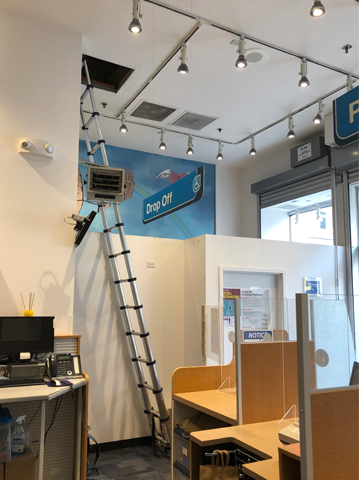A firsthand account of how to tackle tough HVAC installations. James Filauro, our New York-based Account Manager at Nationwide Coils, shares his real-world experience with high-up units. Every year, Nationwide Coils handles hundreds of on-site visits, and one common challenge is dealing with ceiling-mounted HVAC units installed 15 to 30 feet above the ground. These units are often found in retail stores, warehouses, and industrial buildings — places where space is limited and access is tricky. This was the case during a recent visit to Mt. Vernon Middle School, where I was called in to measure a hot water coil and a DX evaporator coil in a Carrier 7.5-ton ceiling unit. While some might have had to climb up and face their fear of heights, I had my own personal challenge: facing the ghosts of middle school. Eeesh. The unit was suspended at 30 feet, surrounded by the building’s structure, making it extremely difficult to access. The contractor was considering dropping the unit just to get the measurements, which would have been both time-consuming and costly. Instead, I climbed up and took a close look before any work began. With a bit of skill and a lot of luck, I managed to capture all the necessary measurements without requiring the unit to be removed. This saved the customer time and money, and kept the project moving forward smoothly. So, what did we learn today? If you're thinking about removing an HVAC unit for measurements, think twice — and maybe give me a call first! forging steel crank shaft. forged steel stem shaft Jiangyin Golden Machinery Equipment Co.,Ltd , https://www.goldenforgingmetal.comSITE BITE: Reaching Those Hard-to-Access HVAC Ceiling Units

A ceiling HVAC unit we accessed during a recent service call to a major U.S. retailer.

Me in middle school. Back to coils now…
Written by: James Filauro
Nationwide Coils Account Manager - NYC/NJ/CT
GET A FREE QUOTE
The steel crankshaft is a critical component in internal combustion engines, such as those found in automobiles, marine vessels, and industrial machinery. It is responsible for coverting the reciprocating motion of the pistons into rotational motion, which ultimately drives the wheels or other machinery.